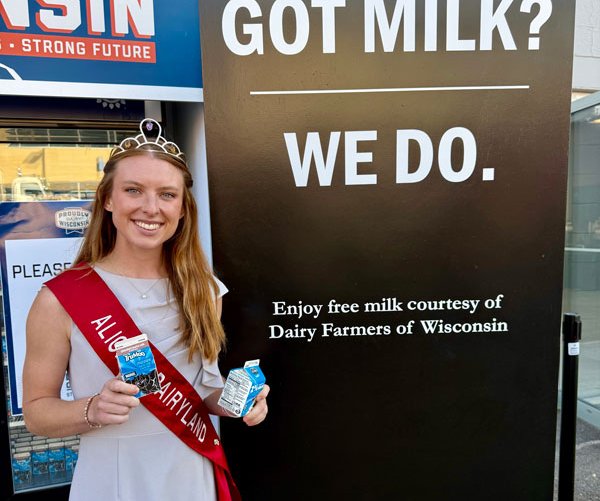Agriculture is a diverse and vibrant industry in Wisconsin. It contributes $104.8 billion to our state economy and provides more than 435,000 jobs in a wide variety of different fields (no pun intended!). Wisconsin also leads the nation in the production of cheese, cranberries, mink pelts, snap beans, corn for silage, milk goats, and dry whey, not to mention being among the top U.S. states for many other commodities.
In what other state can you find people wearing cheese to football games? Our love for cheese runs deep in America’s Dairyland and is a large part of our state’s culture and history. It is almost un-BRIE-lievable how much cheese is made in Wisconsin. In 2020, our state produced more than three billion pounds of cheese! Out of all the cheese made in our state, 23 percent is specialty cheese, such as asiago, feta, gouda, limburger, and swiss. Nationally, consumption and demand for these types of cheese are growing, so much of Wisconsin’s finest specialty cheese is enjoyed outside of state lines. The passion for this dairy delicacy is showcased by our more than 1,200 licensed cheesemakers who craft over 600 styles, types, and varieties of cheese.
A byproduct of cheese production is whey, which is often dried and used as the primary ingredient in protein powders. Wisconsin is the top producer of dry whey, producing more than 30 percent of the nation’s supply. Dry whey, specifically in whey protein powders, is often used by athletes to obtain the necessary amounts of protein on a daily basis. Whey is also used in many other food products, including bakery items, snack foods, sauces, and more. These products can be a great WHEY to support Wisconsin’s dairy industry while adding protein to your diet.
Wisconsin is also the top state in the production of corn silage, which is often used as feed for our dairy cattle. In 2020, Wisconsin produced more than 20 million tons of corn silage, or over 14% of the nation’s total. Growing up on a dairy farm, I vividly remember sitting in the tractor in late fall and watching load after load of corn silage fill the silage bags and silos on our farm. That silage was then used to keep our cows well fed throughout the winter.
Wisconsin mink farmers have an international reputation for producing the highest quality mink pelts in the world. Our state’s climate makes Wisconsin a great place to raise mink and Wisconsin mink producers work hard all year long to keep their mink comfortable. As natural recyclers, mink also help keep food waste from entering our landfills. Wisconsin produces more than 28% of U.S. mink and, in 2020, Wisconsin farmers produced approximately 404,000 pelts, valued at over $13.5 million.
Ginseng also plays a vital role in Wisconsin’s economy. Ranking number one in ginseng production, Wisconsin produces 95 percent of the nation’s crop. Ginseng is primarily grown in the central area of the state including Marathon, Lincoln, Portage, Langlade, and Waupaca counties. This bittersweet root is treasured in many Asian cultures. In fact, the majority of Wisconsin ginseng is exported to Asia.
Summers in Wisconsin are great for growing many different plants, including fruit and vegetables. More than 38.3 percent of the nation’s snap beans (also known as green beans) are grown in Wisconsin. Our state’s snap bean crop is valued at $35.2 million. The next time you buy fresh or frozen green beans, there is a good chance they may have come from right here in Wisconsin!
As our state fruit and our number one fruit crop both in size and value, Wisconsin cranberries also have quite the reputation. Our great state grows nearly 60 percent of the nation’s crop, making Wisconsin the top cranberry producing state in the U.S. Produced by roughly 250 farmers, cranberries are grown on 20,800 acres across Wisconsin. Cranberries offer a delicious and unique flavor and can be enjoyed fresh, dried, frozen, or processed!
Even in the middle of our cold and snowy Wisconsin winters, our farmers and processors are already planning for the warmer months to come. From our nutritious dairy products and award-winning cheeses to unique commodities like cranberries, ginseng, dry whey, and mink, Wisconsin farmers produce high-quality products for consumers around the world. Buying Wisconsin’s safe, nutritious food products supports our farmers and food processors, and contributes to the economic strength of Wisconsin communities. I encourage you to look for Wisconsin products on your next trip to the grocery store!
Learn more about Wisconsin’s number diverse portfolio of agricultural products on the Wisconsin Department of Agriculture, Trade and Consumer Protection’s (DATCP) website: https://datcp.wi.gov/Pages/Publications/WIAgStatistics.aspx.
— Julia Nunes is the 74th Alice in Dairyland, Wisconsin’s agriculture ambassador who works with media professionals to educate consumers about the importance of agriculture to Wisconsin’s economy and way of life. She can be reached at julia.nunes@wisconsin.gov.




